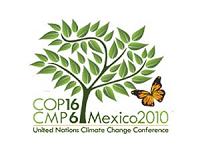| . |  |
. |
Cancun, Mexico (SPX) Nov 30, 2010 Led by the tiny Pacific island of the Federated States of Micronesia, a growing group of low-lying islands and other vulnerable countries are calling for fast action on the approximately 50 percent of global warming that is caused by pollutants other than carbon dioxide (CO2). The scientific case for such a strategy was laid out on the eve of the UN climate negotiations in Cancun, in an Op Ed in The New York Times by Professor Veerabhadran Ramanathan, from the Scripps Institution of Oceanography at the University of California, San Diego, and his colleague, Professor David Victor. Ramanathan and Victor highlight the importance of aggressively reducing CO2 emissions, but note that the road ahead will be long, difficult, and expensive, and that "in the meantime, a fast-action plan is needed." The authors go on to say that reducing the non-CO2 pollutants can delay additional climate warming by several decades. Among the non-CO2 pollutants are hydrofluorocarbons (HFCs), methane, tropospheric ozone, and black carbon soot. Technology is already available to reduce these climate-forcing agents, and doing so would produce strong collateral benefits. For example, reducing emissions from open cooking and diesel vehicles could save many of the 1.9 million lives lost each year due to black carbon soot. Reducing tropospheric ozone can improve public health as well as agricultural productivity. Methane is another potent climate warmer that needs to be targeted; capturing emissions from sources such as landfills and coal mines would benefit the climate system and the gas could then be used as a source of energy. Micronesia submitted a proposal last year to address these very climate warmers - black carbon, methane, and tropospheric ozone - under the UN climate treaty. Micronesia re-submitted their "Programme of Work on Opportunities for Near-Term Climate Mitigation" this year and it will be considered by Parties at the Cancun meetings over the next two weeks. "This is a critical opportunity that all of the Parties in Cancun need to be aware of now," said Durwood Zaelke, President of the Institute for Governance and Sustainable Development, whose group supports action on non-CO2 and will be attending the Cancun meetings. "CO2 is the main game, but it's pretty clear that progress on CO2 is not going to be quick or easy, and we still need to do something fast on climate to buy time - this is what reducing non-CO2 emissions can do for the world." In addition to the Micronesia's proposal on near-term mitigation, there is another major opportunity for climate progress in Cancun: phasing down HFCs under the Montreal Protocol ozone treaty. This has been a parallel effort of Micronesia's for the last few years under the ozone regime, where HFCs are the current substitute for substances that deplete the ozone layer. The U.S., Canada, and Mexico provided their support for this strategy through a separate, but similar "North American" proposal. At the treaty's meeting earlier this month in Bangkok, 91 countries signed onto a declaration supporting the use of low-global warming potential substitutes instead of HFCs which can have hundreds to thousands the warming potential of CO2. The Parties included Micronesia and other small island nations, the Philippines, Indonesia, Bangladesh, Egypt, Congo, Nigeria, the 27 countries of the EU, as well as Japan, the U.S., Canada, and Mexico. The Parties in Cancun can ensure success with this effort - and win a major climate prize of up to100 billion tonnes of carbon dioxide-equivalent in mitigation - by directing the Montreal Protocol to take responsibility for production and use of HFCs (emissions are controlled by the Kyoto Protocol). "Fast action on HFCs and the other near-term climate warmers is essential for the survival of low-lying islands and other vulnerable States," said Andrew Yatilman, Director of Micronesia's Office of Environment and Emergency Management. "This is the time for action and we can do it now, right here in Cancun."
Share This Article With Planet Earth
Related Links Institute for Governance and Sustainable Development Climate Science News - Modeling, Mitigation Adaptation
 US loses leverage in climate talks
US loses leverage in climate talksWashington (AFP) Nov 28, 2010 A year after President Barack Obama worked personally to salvage the Copenhagen climate summit, a political shift leaves the United States with far less leverage while China moves ahead. US negotiators in the UN-led talks in Cancun, Mexico, face the tough task of persuading China and other emerging economies to agree to a binding treaty without offering any concessions that could face a back ... read more |
|
| The content herein, unless otherwise known to be public domain, are Copyright 1995-2010 - SpaceDaily. AFP and UPI Wire Stories are copyright Agence France-Presse and United Press International. ESA Portal Reports are copyright European Space Agency. All NASA sourced material is public domain. Additional copyrights may apply in whole or part to other bona fide parties. Advertising does not imply endorsement,agreement or approval of any opinions, statements or information provided by SpaceDaily on any Web page published or hosted by SpaceDaily. Privacy Statement |